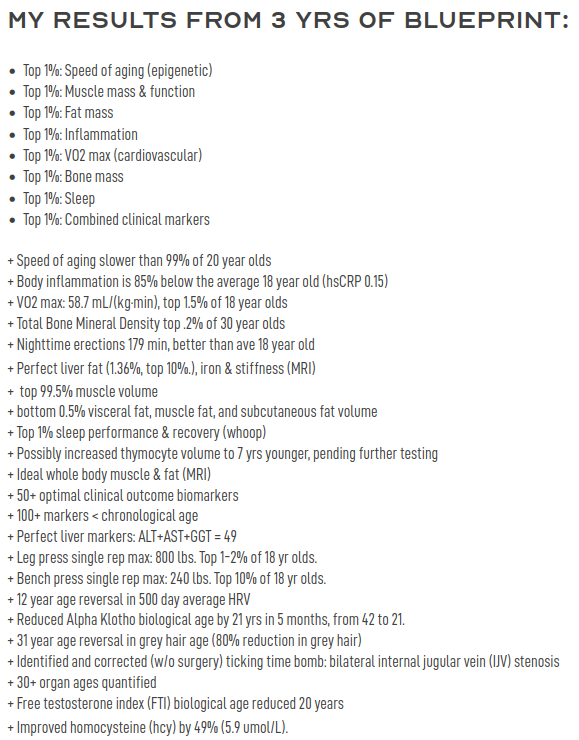It would be nice to know which combinations to use and which to avoid… I keep hearing warnings, but very little actionable advice.
9 Likes
This is also my thinking.
I focus on
Whole food: 30 plants per week; minimum necessary protein
Fasting occasionally
Sleep
Sauna
Sunlight / NIR lamp
Blood donation
Training my body to adapt to a vigorous life….progressive overload using high and low intensity. Training everyday and multiple times a day (sometimes just a little)
Plus a few pharmaceuticals and 10 supplements
14 Likes
Yes, that would be very useful, though problems remain. The issue is that everyone is in a unique situation, what might be helpful for you may be negative for someone else, plus your drug/supplement stack is going to be different. We are slowly entering an era of individualized medicine, and one size fits all was never going to be a realistic approach. That’s the problem with trying to glean actionable advice from population studies - we’re individuals, and each in a unique situation. A given supplement may work great for Bob, but not for you, so testing - when practical - is essential.
8 Likes
Curious
#5
Yes, This is very important. We are not population averages. I have cut down on my supplements, but I think I have still more to do when it comes to reducing my regim.
4 Likes
The problem with this sort of approach is that it fails to recognise that what people consume matters. Some trace elements need traces and there are optimal levels for many things.
If you take metabolites such as Alpha Keto Glutarate, Melatonin or Citrate then it is possible to skew the metabolism a bit. That may be good and it may be bad depending upon the molecule and the dosing.
However, in the end the number of pills is not the issue.
6 Likes
LukeMV
#7
I know I’ve said it before in another thread but I really think this is way overblown. We are really supposed to worry about some mystery risk of taking too many supplements at once?
Should we also worry about eating too big of a variety of food choices too because one might negatively interact with another?
I’d say there is likely to be more synergistic effects than antagonistic effects in most cases.
Until I see harm in specific combinations of supplements, I’m not going to worry about this. Until then, it’s all speculation.
12 Likes
I broadly agree with @LukeMV here.
For those of us who want to capture as much benefit as possible, I see three options:
-
Unmitigated Optimism: Take everything and hope for the best. Accept that some of the molecules you’re taking may amplify each other, cancel each other out, or synergize pathologically. Console yourself with the knowledge that whole foods contain a wide variety of molecules and that consuming them in isolation is actually a recent innovation. This approach leaves nothing on the table: if there’s a chance it will help, I want it. Death is a given, so I might as well throw everything I can at it.
-
Moderate Precaution: Take most things and plan for the best. Accept that you cannot account for all of the potential interactions, but design your supplement stack based on what you do know. Reduce interactions by spreading your supplements across multiple timepoints throughout the day, operate on an A/B schedule (e.g. Tues, Thurs, Sat and Wed, Fri, Sun with nothing on Mon), operate on longer cycles (e.g. four weeks of the A/B schedule followed by one week off), place molecules with known interactions on separate days, avoid hitting the same pathway from multiple angles, and adjust your regimen based on relevant bloodwork and new research. This approach leaves very little on the table: if preclinical evidence aligns with a promising mechanism, I’ll find a place for it.
-
Risk Aversion: Take the best things and skip the rest. Accept that you will miss out on potential benefits to avoid unknown pathological synergies. Rather than spending money on a more diverse set of supplements, spend money on higher doses of supplements with the best evidence. As with #2, spread out the higher doses across the days, weeks, or months as you see fit. Introduce new molecules as new research becomes available. This approach leaves most things on the table: if clinical data supports it, I’m in. Otherwise, why risk my health and waste my money?
Personally, I follow the second option (moderate precaution).
13 Likes
Sure, if I have a deficiency, then I should definitely resolve it. But if I am going to be more aggressive, such as assuming a benefit will follow because:
- smart people are taking it
- tends to decline during aging
- shows life extension benefits (on average) in mice (that lived in a cage)
- etc
Then how do I weigh the upside and downside? Very carefully, and I try to err on losing some uncertain tiny upside from a chemical to avoid an uncertain big downside from a chemical. After all, I’m pretty healthy. I don’t want to blow it.
Physicist Richard Feynman once said, “The first principle is that you must not fool yourself, and you are the easiest person to fool”. He was talking about me.
7 Likes
Tim
#10
Bryan Johnson is a hack, a mercenary, a mediocrity. Don’t know why he’s lionized on this site.
4 Likes
A_User
#11
Mercenary for what army? And regarding mediocrity, his stats and biomarkers seem pretty good…

6 Likes
Bryan is marketing what he is doing.
But isn’t that an effective way to spread the word amongst those that will listen?
Even I have gotten some actionable items from his example.
2 Likes
Tim
#13
His $49 “Longevity Mix,” or for true believers his “Blueprint Supplement Stack” for $195.
1 Like
“+ 31 year age reversal in grey hair age (80% reduction in grey hair)”
He dyes his hair by his own admission yet he also promotes this stat…? What else is he lying about, I wonder? This sort of BS is why I don’t follow or even listen to his age hacking advice.
I’m too busy trying to be a healthy person.
But, each of us must find a path we believe in. I don’t know if the belief is important, but I am certain the disbelief is a barrier.
10 Likes
In the absence (of course) of definitive answers we at Healthierfriends.org (longevity information hub, non profit) thought compiling what the major figures in the field take may provide valuable data: check The experts choice
The “experts” choice is somehow arbitrary although we have from Alan Green (RIP) to Bryan Johnson. We only require them to really disclose their choices. You can suggest more.
Best
3 Likes
I reviewed your experts and the supplements and medicines they are taking, and it’s a great starting point. However, I’d be curious why other leading medicines and supplements such as SGLT2i, GLP1, ARBs, Astaxanthin, GlyNAC, etc. are not listed. It seems like many promising supplements/medications are off the radar.
1 Like
I’ll be honest, I see very limited benefit from knowing the drug/supp stack of random longevity mavens. I say that because sometimes friends who know of my interest in longevity ask about my stack. At that point I’m torn, because my stack, just as I imagine any careful longevity enthusiast’s stack, is very tightly bound to my own very individual situation and in no way instructive to someone who is not intimately familiar with it. If my situation is that I’m prediabetic, have high ApoB, high BP etc., my stack will reflect that, and be entirely inappropriate for someone with a different set of vulnerabilities. It’s like asking “what’s a good size of pants”, it’s going to depend entirely on your specific body. Even something like rapa is not appropriate for everyone. What exactly are we supposed to get out of such lists? “Here are the sizes of pants worn by famous fashion designers!”… oh, ok, what do I do with this info? Whatever benefit there is, seems, to me, pretty limited. But YMMV.
2 Likes
It allows you to consider other options and how well they are accepted by the scientific community as being valuable. If there’s one leading longevist taking Supplement X for longevity, you’ll probably pass. If everyone is doing it, you’ll probably do a deep dive on it and find out why.
This approach led me to most of my supplements/meds including Rapamycin. So, it’s useful IMHO.
The first person’s stack I mimicked was David Sinclair before moving on to @Rapadmin and @desertshores 's 
3 Likes
We keep all those on our radar but despite the promising studies we still find too few of our experts are taking them so they havent achieved “critical mass” yet. We review ecery 3 months or so, so some may make the list soon.
2 Likes
With very little exceptions like people taking statins due to a medical condition, these guys have chosen their stack for longevity purposes and while we dont expect anybody to say “if its good for Sinclair ita good for me”, when you see that some substances are taken by more than half of them (like D Vitamin or magnesium) we believe that means something. But yes, there is nothing written in stone and everyone needs to chose what to make of this info 
2 Likes
mccoy
#22
The website is interesting; However, I went to the ‘experts’ page and clicked on Dr. Sandra Kauffman. I’ve read her 2 monographies on longevity supplements plus I’ve been listening to several hours of interviews with her.
She says she takes all 42 supplements listed in her books. More recently, she affirms she added various pharmaceutical drugs which in some cases she thinks are more effective than supplements (for example, I remember dasatinib).
In the website though, only five supplements are cited. I wonder what’s the criterion.

3 Likes